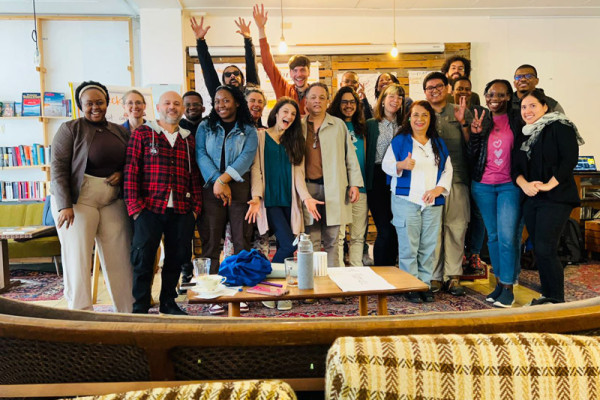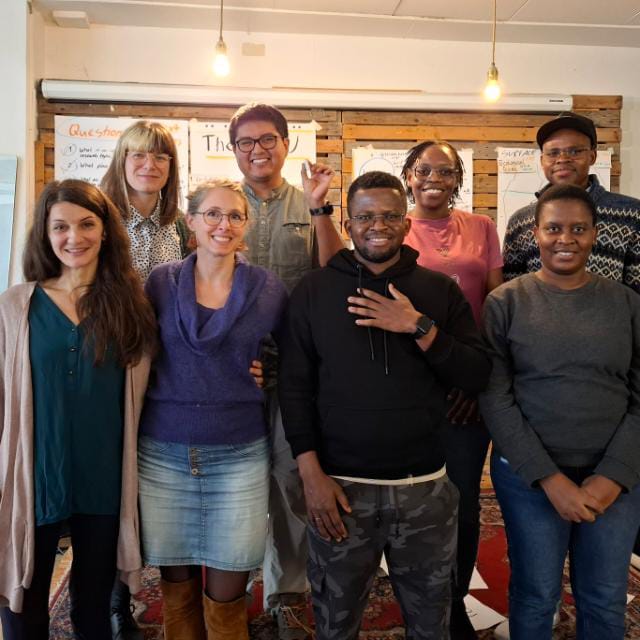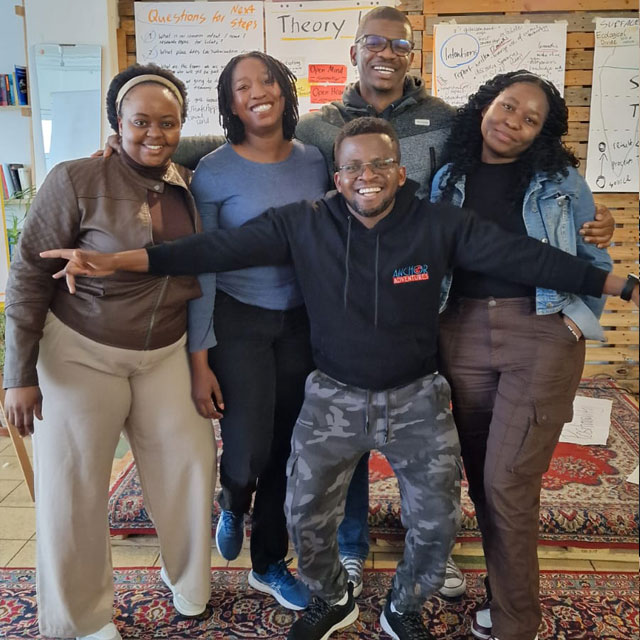Who we are?

Aim
In the Social Change Lab for Knowledge Equity (SCLaKE) project, three universities from Germany, Botswana, and Colombia create a change laboratory in order to train their self-reflection and epistemological understanding of research methods and socio-economic theories in agriculture, food, and natural resource use. The self-reflection operates against a political background addressing multiple calls in academia and pedagogy to face cultural and colonial framing in science. We acknowledge that the worldview that created the challenges humanity faces in reaching the sustainable development goals (SDGs) today, cannot alone be a fundament for global solutions to these challenges.
Second, we recognize that the on-going process of internationalization in research and teaching is inscribed in power relationships among countries, and among existing knowledge systems including diverse actors creating knowledge globally. Consequently, we postulate that research and tertiary education will increase in quality and in relevance in the face of global challenges when a diversity of knowledges – on the management of natural resources for agriculture and food especially – are developed, validated, mainstreamed, and placed on the same pedestal as the global knowledge system within the context of research and teaching. Opening up different knowledge sources requires more than a mere collection of information: the Social Change Laboratory in this project will support this process through enabling and nurturing a structured process of self-reflection on ontology and values attached to knowledge, theories and research practices from a decolonial perspective in order to deconstruct underlying power inequalities. Creating a space for knowledge equity in research and teaching will reveal new pathways towards a more holistic and sustainable management of our earth’s social and natural resources, and most especially SDGs 2, 4, 10, 11, 12, 16 and 17.
Scientific background
Few agricultural and development economists consider themselves to be part of the humanities, while socio-economic theories tend to be taught as fixed and universal. In this project, we want to address agricultural and development economics as a social science under the paradigm of constructivism. When we consider these disciplines as resulting from social construction processes, it becomes possible to analyze their realm of validity and to see how it can be modified or complemented.
The Cartesian scientific paradigm and the euro-centric modern economic theories are rooted in a specific epoch/time and place/space. Specifically, we consider that culture and power play an immense role in the shaping of economic theory and its application in agricultural and rural development. The project members will thus use the insights of decolonial thought and epistemology developed among social scientists and apply these specifically to the field of agricultural and development economics. Our main aim is to train researchers and lecturers who do not have a background in philosophy and epistemology to conduct research and teach in a world currently engaging in a radical change in worldview.
Approach
Our method, the Social Change Laboratory, supports this kind of organizational learning and enhances the capacity for creating and implementing new conceptual and practical tools in research methods and teaching in the use of natural resources. SCLaKE will support researchers and students in designing culturally, politically, and ecologically sound solutions for human use of natural resources. Students both contribute to the change lab with their research works and benefit from culturally sensitive teachings. Ultimately, students (future decision makers) will be able to take decisions towards a more just and empowered distribution of resources.
Our tools are (i) self-reflective practices, (ii) safe spaces for critical exchange, (iii) the formalization and institutionalization of these processes and co-occuring changes in awareness (awakening) in supervision or research practices or planning. Our tangible outputs include a 2 ECTS training module and two scientific papers on “Ways of knowing”, as well as a working paper documenting the Change Lab process. More generally, the project makes an exciting and solid contribution to the current call for decolonization in science, piloted in our three universities. Related programs will benefit from our critical approach to question the cultural roots of knowledge and thereby question the nature of North-South cooperation in higher education.
Institutional embeddedness
SCLaKE builds upon existing long-term established cooperation in two focal regions of the JLU internalization strategy and in particular with the University of Botswana (UB) and the University of Antioquia (UdeA) with whom the applicant has worked successfully since 2019 and 2011 respectively. Both a South-South and a North-South cooperation interlinking the focal regions will take place. The development aims of our project (SDGs targeted) overlap with interests and activities of further networks and institutions at the JLU (PLUS, SDGnexus Network, IPPAE, CAPAZ), UdeA (CAPAZ) and UB (IPBES, UNDP), which are ready to interact with SCLaKE. FiFinally, the JLU has extensive experience in managing international, interdisciplinary, and participatory processes as well as a working group on decolonization and epistemology. UdeA has a long established practice of using self-reflection tools, and UB as well as UdeA have worked with indigenous knowledge and groups. The workshops are central activities of the Social Change Lab: they support the change process with the realization of the U-theory.here will be 4 physical workshops, one each year: Giessen (2024, 2027), Medellín (2025) and, Maun (2026). During the workshops, a common understanding of the problem and of the research practices SCLaKE aims to change as well as the outputs they will produce will be determined.
The main challenge of meeting physically is the commitment of participants to make time for getting to know one another in the new South-South relations SCLaKE establishes. The partners have already met through regular videoconferencing while preparing this proposal, which increased the relevance and motivation in the project for the partners. Each partner has agency in which it will also organize and host a physical workshop and will be responsible, with the support of the coordination position and the change lab facilitator for its content.
Teams
Justus-Liebig-Universität Gießen

Aspasia Werner
Link: Dr. agr. Sc. Werner, Aspasia — Faculty 09
Charity Gabanthate Masole
Link: Charity Gabanthate Masole — Agricultural Policy
Chukwuma Ume
Link: Dr. Chukwuma Ume — Institut für Agrarpolitik und Marktforschung
David Singaña Tapia
Link: David Singaña Tapia — Agricultural Policy
Sakeus Kadhikwa
Link: Sakeus Kadhikwa — Agricultural Policy
Sarah Robi Wambura
Link: Sarah Robi Wambura — Agricultural Policy
Stéphanie Domptail
Link: Dr. Stéphanie Domptail — Agricultural Policy
Universidad de Antioquia

Alhen David Ramirez Ceballos
Link: CvLAC – RG
Andrés Julián Londoño:
Link:CvLAC – RG
Diego Ochoa Mesa
Link: CvLAC – RG
Esperanza Gomez Hernandez
Link: CvLAC – RG
Gerardo Vasquez Arenas
Link:CvLAC – RG
Vladimir Betancur Arias
Link: CvLAC – RG
University of Botswana

Kelebogile Motlhabane
Oluwatoyin (Toyin)
Dare Kolawole:
Staff Profiles | University of Botswana
Poloko Kefitlhile
Shathani Montsho
Tebo Kgosiemang:
ORCID

